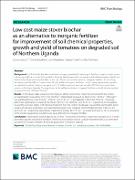| dc.description.abstract | Soil fertility decline due to nutrient mining coupled with low inorganic fertilizer usage is a major cause of low crop yields across sub-Saharan Africa. Recently, biochar potential to improve soil fertility has gained significant attention but there are limited studies on the use of biochar as an alternative to inorganic fertilizers. In this study, we determined the effect of maize stover biochar without inorganic fertilizers on soil chemical properties, growth and yield of tomatoes (Solanum lycopersicum L.). A field experiment was conducted in 2022 for two consecutive seasons in Northern Uganda. The experiment included five treatments; inorganic fertilizer (control), biochar applied at rates of 3.5, 6.9, 13.8 and 27.6 t ha-1.
In this study, maize stover biochar improved all the soil chemical properties. Compared to the control, pH significantly increased by 27% in the 27.6 t ha-1 while total N increased by 35.6% in the 13.8 t ha-1. Although P was significantly low in the 3.5 t ha-1, 6.9 t ha-1 and 13.8 t ha-1, it increased by 3.9% in the 27.6 t ha-1. Exchangeable K was significantly increased by 42.7% and 56.7% in the 13.8 t ha-1 and 27.6 t ha-1 respectively. Exchangeable Ca and Mg were also higher in the biochar treatment than the control. Results also showed that plant height, shoot weight, and all yield parameters were significantly higher in the inorganic fertilizer treatment than in the 3.5, 6.9, and 13.8 t ha-1 treatments. Interestingly, maize stover biochar at 27. 6 t ha-1 increased fruit yield by 16.1% compared to the control suggesting it could be used as an alternative to inorganic fertilizer.
Maize stover biochar applied at 27.6 t ha-1 improved soil chemical properties especially pH, N, P and K promoting growth and yield of tomatoes. Therefore, maize stover biochar could be recommended as an alternative to expensive inorganic fertilizers for tomato production in Northern Uganda. | en_US |


